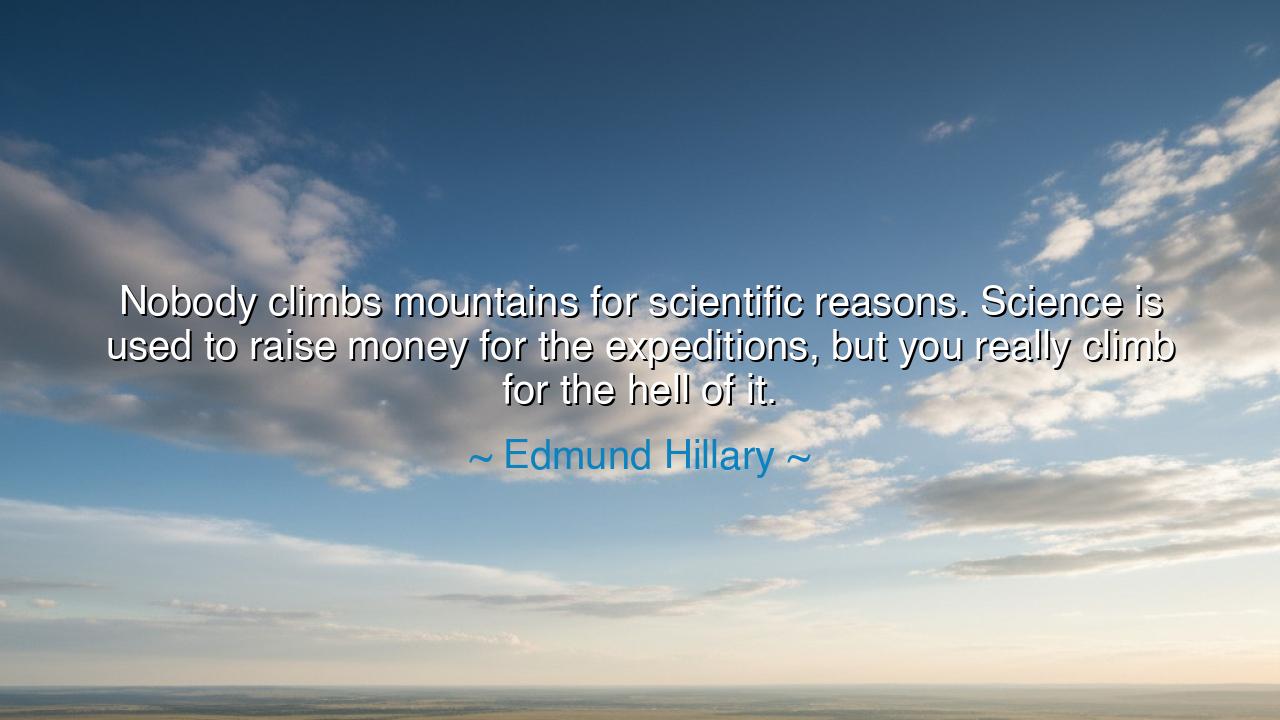
Nobody climbs mountains for scientific reasons. Science is used
Nobody climbs mountains for scientific reasons. Science is used to raise money for the expeditions, but you really climb for the hell of it.






"Nobody climbs mountains for scientific reasons. Science is used to raise money for the expeditions, but you really climb for the hell of it." These words from Edmund Hillary, the great explorer who first conquered Mount Everest alongside Tenzing Norgay, speak to the true, primal spirit of human ambition. At first glance, it seems like a disdain for the scientific community or the need for knowledge, but in reality, Hillary reveals something far deeper—the unspoken reason that drives individuals to pursue the impossible, to conquer the towering peaks that challenge both body and spirit. The mountain itself, in its towering majesty, is not just a physical obstacle—it is a symbol of something far greater, something intrinsic to human nature: the desire to test the limits, to push beyond the known, and to prove to oneself what it means to truly live.
In the ancient world, great adventurers and warriors like Hercules, the hero of Greek myth, were revered not for the sheer practicality of their feats, but for the courage to embark on quests that were driven by a spirit of challenge and glory. Hercules’ twelve labors, while ostensibly undertaken to fulfill a divine prophecy, were driven by the deep, unspoken desire to confront impossible odds. This quest for something beyond mere survival, beyond logic and reason, was the very essence of what Hillary speaks to—the human drive to climb, not because of a scientific need, but because of something far more intangible. The true motivation is in the struggle itself—the pursuit of meaning and purpose that transcends reason.
Consider the story of Sir Ernest Shackleton, the great Antarctic explorer, whose ill-fated voyage on the Endurance became a defining example of human perseverance in the face of impossible odds. Shackleton’s expedition was not driven by scientific discovery alone; rather, it was driven by the call of the unknown, the pull to conquer a land that had never been fully explored. His leadership in the face of adversity—when his ship was crushed by ice, and the crew was stranded in the most inhospitable environment on Earth—is remembered not for the knowledge it produced, but for the unwavering spirit that Shackleton embodied. His journey, much like Hillary’s, was not simply about gaining knowledge but about pushing the boundaries of human willpower and endurance.
Hillary himself, standing atop the world’s highest peak, did so not solely for scientific curiosity but as an embodiment of the human spirit’s drive to conquer what seemed unconquerable. His famous words, "Because it’s there", resonate deeply with the essence of human desire. The mountain is a metaphor for life’s struggles—the obstacles we face that are too great, too daunting, yet drive us to climb nonetheless. Science, in this context, becomes a tool, a means to fund and facilitate the journey, but not the ultimate reason behind it. The real reason, Hillary suggests, is the innate desire to achieve the impossible, to challenge oneself against nature’s might, to find meaning in the act of pushing beyond what is known.
This unquenchable thirst for the unknown and the impossible can also be seen in the ancient myths of Odysseus and his ten-year journey home after the Trojan War. Odysseus' journey was not merely about returning to Ithaca, but about confronting the gods, the monsters, and the mysteries of the world. He was driven by a quest for glory, self-discovery, and purpose, not simply by the desire to return home. Like Hillary, Odysseus sought meaning in the struggle itself, in the odyssey of life and the challenges that define the human condition.
The lesson that Hillary’s words impart is clear: while science and reason have their places, there are moments when human action is driven not by logic but by the pursuit of something greater. To climb a mountain, to embark on an arduous journey, is not simply to gain knowledge or to satisfy curiosity—it is to engage in the deeper search for self and for purpose. These quests are not always about practical benefits, but about confronting fear, unknowns, and the very limits of our strength. The true reward lies not in the summit but in the journey itself, in the overcoming of obstacles, and in the realization of human potential.
In our own lives, we must strive to embrace both reason and passion in our pursuits. While knowledge and science provide us with the tools to navigate the world, we must also recognize the importance of challenge and risk in our lives. Whether it is the pursuit of a professional goal, the journey of self-discovery, or the willingness to face life’s deepest fears, we must push beyond the comforts of the known and the safe. Like Hillary, let us climb not because it is easy, but because it is there—because life’s great challenges are meant to be faced, not with calculation, but with the courage to discover the true meaning of our existence.






AAdministratorAdministrator
Welcome, honored guests. Please leave a comment, we will respond soon